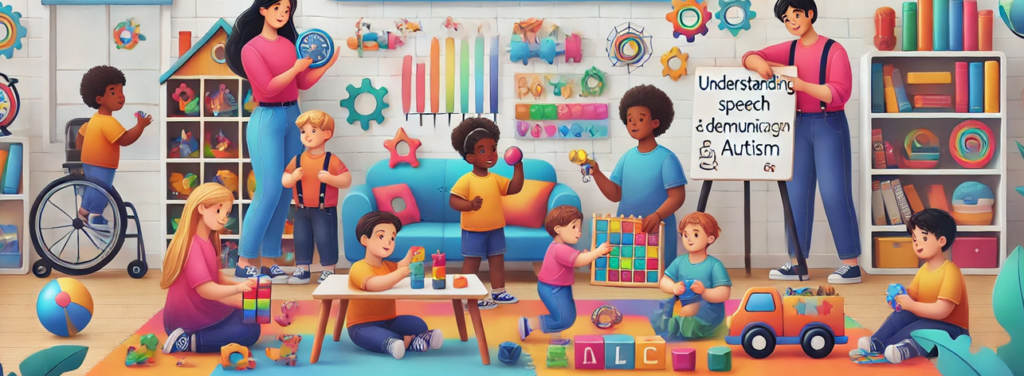Speech delay is a common concern among parents and caregivers, especially during the critical early years of a child’s development.
While it can be an indicator of autism, not all speech delays are related to autism. Understanding the difference is essential for providing the right support and intervention for a child.
What Is Speech Delay?
Speech delay refers to a lag in a child’s ability to develop speech and language skills compared to typical developmental milestones. This may include delays in:
- Speaking their first words.
- Combining words into sentences.
- Using language to communicate effectively.

Speech delays can result from various factors, including hearing impairments, developmental disorders, or environmental influences such as limited exposure to language-rich interactions.
How Does Speech Delay Relate to Autism?
Autism Spectrum Disorder (ASD) is a neurodevelopmental condition characterized by challenges in communication, social interaction, and repetitive behaviors. While speech delay can be a symptom of autism, it is not exclusive to the condition.
Many children with speech delays do not have autism, and some individuals with autism may not exhibit significant speech delays.
Key distinctions include:
- Speech delay in autism: Often accompanied by other signs such as difficulty with nonverbal communication (e.g., limited eye contact, lack of gestures) and challenges in social interactions.
- Isolated speech delay: May occur without other developmental concerns and often improves with targeted interventions such as speech therapy.
Signs of Autism-Related Speech Delay
If a speech delay is related to autism, it is often accompanied by:
- Limited use of gestures such as pointing or waving.
- Difficulty responding to their name.
- Lack of interest in social games or interactions.
- Repetitive behaviors or restricted interests.
- Challenges in understanding and using nonverbal cues, such as facial expressions.
These signs typically appear by the age of 2 or 3 and may prompt further evaluation for autism.
Causes of Speech Delay in Autism
The underlying causes of speech delay in autism are complex and not entirely understood. Research suggests that differences in brain development and connectivity may play a role.
Additionally, challenges in sensory processing and social motivation can impact a child’s ability to develop language skills.
Diagnosing Speech Delay and Autism
If a child exhibits speech delays, a comprehensive evaluation is crucial to determine the cause. This may involve:
- Hearing tests to rule out auditory impairments.
- Developmental screening to assess milestones.
- Autism-specific assessments conducted by specialists such as developmental pediatricians or psychologists.
Early identification of autism can lead to timely interventions that support communication and overall development.
Addressing Speech Delay in Autism
Intervention strategies for speech delay in children with autism include:
- Speech and language therapy: Focused on building communication skills and vocabulary.
- Applied Behavior Analysis (ABA): Helps improve communication and social behaviors through structured approaches.
- Augmentative and Alternative Communication (AAC): Tools such as picture exchange systems or speech-generating devices can aid nonverbal children.
- Parent training: Equips families with strategies to encourage language development at home.
When to Seek Help
Parents and caregivers should consult a healthcare professional if a child:
- Is not babbling or using gestures by 12 months.
- Has not spoken their first words by 16 months.
- Cannot combine two words by 2 years.
- Shows a loss of previously acquired language or social skills.
Conclusion
While speech delay can be a sign of autism, it is not definitive proof of the condition. Each child is unique, and a thorough evaluation is necessary to identify the underlying cause of a speech delay.
Early intervention, regardless of the diagnosis, can make a significant difference in a child’s development.

For more information and resources on autism and speech development, visit 0autism.com.